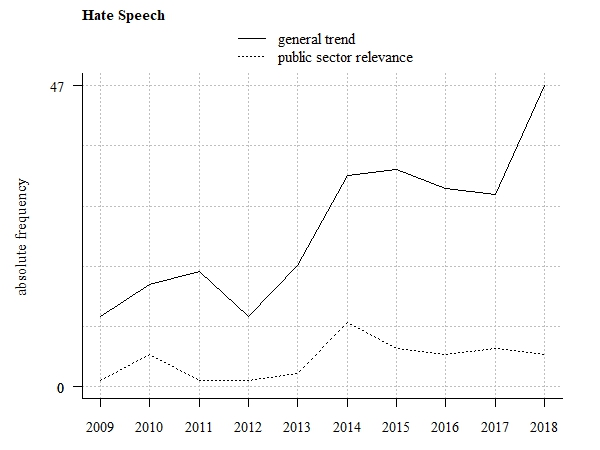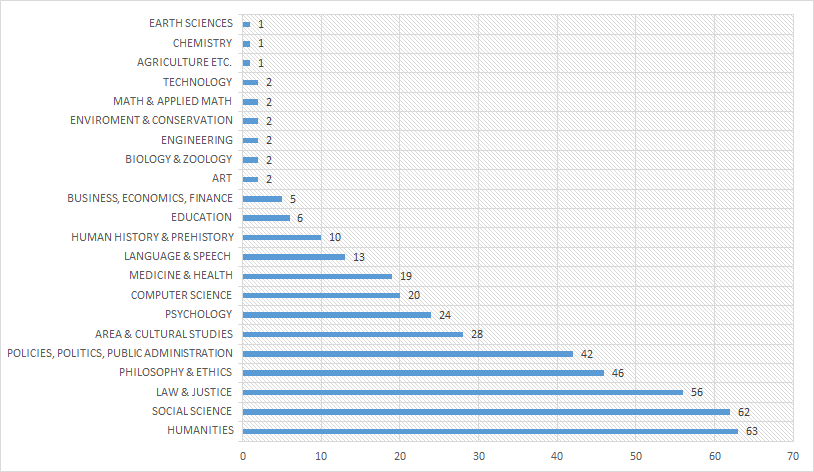Open data - Download the Knowledge base
You are free to download the data of this Knowledge base.
To do this you must be an authenticated user: log in or sign in now.
All the data are licensed as Creative Common CC-BY 4.0.
Hate speech is commonly defined as any communication that attacks a person or a group because of its origin, colour, ethnicity, gender, sexual orientation, nationality, religion, or other characteristic. Due to the massive rise of user-generated web content, in particular on social media networks, the amount of hate speech is also steadily increasing. [1][2]
New communication technologies and social media platforms offer many opportunities and can facilitate public communication. However, they can also have negative influence: the anonymity of the Internet suggests a security that allows insults and defamation of others in an apparently save haven.
Some politicians also use hate speech. It is assumed that this can and will influence electoral support. [3]
As Cammarts notes, the “Internet gives rise to anti-public spaces, voicing hatred and essentialist discourses”. To counteract this development, many countries have already adopted laws against hate speech. However, a conflict of objectives can be detected here because also the freedom of speech must be protected, as it is an important pillar for democracy. [4]
It must therefore be weighed carefully and examined in each case, whether or not something can be called hate speech.


| Agenda Setting | Policy Design and Analysis | Policy Implementation | Policy Monitoring and Evaluation | |
|---|---|---|---|---|
| Agriculture, Fisheries, Forestry & Foods | ||||
| Economy & Finance | ||||
| Education, Youth, Culture & Sport | ||||
| Employment & Social Security | ||||
| Environment & Energy | ||||
| Health | ||||
| Foreign Affairs and Defence | ||||
| Justice, Legal System & Public Safety | ||||
| Public Affairs | ||||
| Innovation, Science & Technology | ||||
| Urban Planning & Transport | ||||
| Institutional Questions / Internal Affairs |
You are free to download the data of this Knowledge base.
To do this you must be an authenticated user: log in or sign in now.
All the data are licensed as Creative Common CC-BY 4.0.
About hate speech and freedom of speech
Most freedom of speech debates now start on the false premise that denying someone a platform is censorship. So we must begin with the correct one, which is that freedom of speech is freedom from punishment. If you are not being convicted and penalised by the state for speaking, then you have freedom of speech. If just one channel of speech has been denied to you, you still have freedom of speech. If we start banning those whose views we don’t like, what next? In general, one should be suspicious of “what next?” arguments, because they assume that humans are incapable of behaving in calibrated ways that don’t inevitably lead to some future state of fascism. We could extend the right to platform and rally to all, but what next? Paedophile rallies? That’s obviously absurd, but it highlights the fact that there are limits, and they are broadly dictated by how much certain values are coded within society. The reason free speech proponents are not out there fighting to hear from child abusers or some radical Muslim clerics is because society or the law regulate the more unpalatable or illegal views away before we have to deal with them at Speakers’ Corner. In On Liberty, John Stuart Mill, one of the great defenders of free speech, says a struggle always occurs between the competing demands of authority and liberty. He argues that we cannot have the latter without the former: “All that makes existence valuable to anyone depends on the enforcement of restraints upon the actions of other people. Some rules of conduct, therefore, must be imposed – by law in the first place, and by opinion on many things which are not fit subjects for the operation of law.”
This is the reason why many platform are now try to find technological solutions (automatic detection) to limit or ban hate speech. If the same technology can be used for censorship that is a key question open to debate.